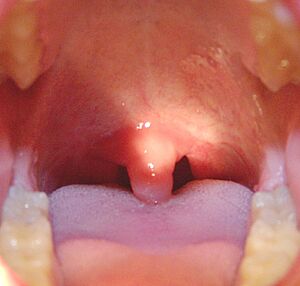Uvula facts for kids

The uvula is a small, soft, punchbag-shaped part that hangs down in the back of your throat. It's right in the middle of the soft roof of your mouth, called the soft palate. If you gently touch your uvula, it can make you feel like you need to gag or even vomit.
Contents
What the Uvula Does
The uvula has a few important jobs.
Helping You Swallow
When you swallow food or drinks, your soft palate and uvula work together. They move up to close off the space at the back of your nose, called the nasopharynx. This stops food and liquids from accidentally going up into your nose.
The uvula also makes a lot of thin saliva. This helps keep your throat moist and lubricated, which makes swallowing easier.
Helping You Speak
The uvula also plays a role in how we speak. In many languages, like French, Arabic, and Hebrew, some sounds are made by using the uvula. These are called uvular consonants. You make these sounds by bringing the back of your tongue close to your uvula, which changes how air flows out of your mouth. Because the uvula makes so much saliva, some people think it's an extra part of our body that helps us speak.
Protecting Your Airway
The uvula can also act like a sensor for food. It helps to stop small pieces of food from being breathed in, which could cause you to choke. It also helps you breathe properly between mouthfuls of food.
Health Issues with the Uvula
Swollen Uvula (Uvulitis)
Sometimes, the skin around the uvula can swell up. This condition is called uvulitis. When it swells, the uvula can become much bigger than normal, sometimes 3 to 5 times its usual size. If a swollen uvula touches your tongue or the back of your throat, it can feel like you're gagging or choking, even if there's nothing actually there. This can make it hard to breathe, talk, or eat.
There are several reasons why your uvula might swell. It could be from not drinking enough water (dehydration), especially in dry weather. Smoking too much or breathing in other things that irritate your throat can also cause it. Snoring, allergies, or an infection from a virus or bacteria can also make it swell. Sometimes, a sore (like an aphthous ulcer) on the uvula can cause swelling and discomfort.
If your uvula is swollen because you're dehydrated, drinking more fluids might help. If a bacterial infection is the cause, gargling with salt water can sometimes make it feel better. Usually, a swollen uvula is not serious and gets better on its own within about a day.
Snoring and Sleep Problems
The uvula can also cause snoring or heavy breathing while you sleep. If your uvula is longer than usual, it can vibrate when you breathe, leading to snoring. In some cases, this can lead to a condition called sleep apnea. Sleep apnea is when your breathing stops and starts many times while you sleep. Sometimes, doctors might suggest surgery to remove part or all of the uvula to help with snoring or sleep apnea. This surgery is called uvulopalatopharyngoplasty (UPPP).
Trouble with Speech and Swallowing
For a small number of people, the uvula doesn't close properly against the back of the throat. This is called velopharyngeal insufficiency. When this happens, extra air can come out through the nose when you talk, making your voice sound "nasal." It can also make it hard to say certain sounds correctly.
Sometimes, when you swallow, the uvula and soft palate don't close off the back of the nose completely. If this happens, food or drinks can accidentally go up into your nose. This is called nasal regurgitation. It can happen if you have certain muscle or nerve problems. It can also happen if you cough very hard, as coughing can stop the uvula from blocking the nose, causing liquid to come out.
Uvula in Different Cultures
In some parts of Africa, like Somalia, Ethiopia, and Eritrea, traditional healers sometimes remove part of the uvula as a ritual. This can make the uvula look shorter. Doctors don't think this usually causes problems with speech, unless a person's tonsils have also been removed.
Where the Word "Uvula" Comes From
The word "uvula" comes from the Latin language. In Latin, ūvula means "little grape." This is because a swollen uvula was once called ūva, which means "grape."
See also
 In Spanish: Úvula para niños
In Spanish: Úvula para niños
 | Janet Taylor Pickett |
 | Synthia Saint James |
 | Howardena Pindell |
 | Faith Ringgold |

